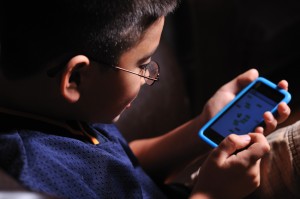 I found myself drinking fine wine with a bunch of neurosurgeons this weekend, and it didn’t take long to realize they’re asking the same question as every modern parent– how much screen time is okay for toddlers, and is there such a thing as good screen time? So over wine and an iPad we played through the apps these brilliant young surgeons are letting their toddlers have. There is logic behind their choices.
I found myself drinking fine wine with a bunch of neurosurgeons this weekend, and it didn’t take long to realize they’re asking the same question as every modern parent– how much screen time is okay for toddlers, and is there such a thing as good screen time? So over wine and an iPad we played through the apps these brilliant young surgeons are letting their toddlers have. There is logic behind their choices.Apple sold its 200 millionth iPad this month. By comparison, it took 45 years for the TV to reach 200 million people. Ours is a crucial generation of parents, the last generation to grow up without smart phones, tablets, and on-demand digital stimulation. In fifteen years we will hear, “I had my own iPad when I was two-years-old and I turned out just fine.” We are the only generation to have opinions about screen time that are not colored by a childhood spent on touchscreens. Although preliminary research exists, no one really understands the effects of tablets and smartphones on the developing toddler brain. The American Academy of Pediatrics recommends no screen time for babies and toddlers under age two and limiting recreational screen time to two hours per day for older children. As tablet sales soar, the AAPs own experts have openly questioned whether this recommendation needs to be revised. My colleague, Dr. Kirstin Lee, writes about why iPads are good for toddlers.
I’m usually a data-oriented, scientifically-minded mom, but when it comes to screen time and toddlers there just isn’t much data to support the choices we make every day. In the absence of good data, it’s reasonable to solicit the opinions of experts. And so my ears perked up when these neurosurgeons started talking about screen time for their children. These are research physicians who have committed their lives to understanding how the brain heals, develops, and adapts; physicians who spent about thirty years in their own education and training. When it comes to their kids on screens, they have opinions.
Here are the five favorite apps neurosurgeons let their toddlers play:
- Dragon Box: This puzzle-game app is designed to secretly teach algebra to kids ages 5+, although plenty of reviewers find their 4-year-olds love it. Kids move through 200 levels without ever realizing they are doing math. Using pictures instead of numbers kids learn basic algebraic concepts, such as making two sides equal. On average, it took 41 minutes and 44 seconds for students to master algebra skills using the DragonBox app at the Washington State Algebra Challenge. The puzzles get trickier as you move through the levels… you’ll find yourself as addicted as your child. There is another version intended for children ages 12+. $4.99 in the App Store.
- Numbers League: A super-hero based math game, this app teaches arithmetic without the usual do-some-problems-so-you-can-play-a-game bribery. In the words of its creators, “Clever use of basic math skills will save the day. The more you play, the sharper these skills will become until no villain is safe from your numerical onslaught in the streets of Infinity City. Our only hope is the Numbers League. Assemble a team of superheroes and use the sum of their incredible powers and ingenious devices to capture as many villains as you can.” $3.99 in the App Store.
- Puzzle Retreat: This block-sliding puzzle game is a fun brain workout for toddlers through adults. The challenge comes from working out the correct order to slide the blocks and really ramps up with the addition of special blocks including Fire Blocks, Stop Blocks and Arrow Blocks, which alter the direction of sliding blocks. This game is frustration-free, an essential feature for young children. There are no time limits, and you can skip a puzzle and move to another if you are stumped. Available for Apple and Android. Free download. First 60 puzzles are free, then additional puzzles can be purchased.
- Magic Maze Adventure Game for Kids: This collection of 32 mazes in both 2D and 3D teaches kids spatial processing and requires them to think ahead and plan several steps in advance. You have to “think outside of the box” and find unlikely answers to solve mazes. Mazes also help children practice fine motor skills and improve handwriting. $1.99 in the App Store.
- Typing Fingers: Is your toddler ready to learn how to type with the correct fingers? Yes! Typing is a practical skill that will change the way your toddler learns to use a computer and communicate. Children as young as 4 or 5 can learn to type with Typing fingers, a simple but fun game with animated characters. This app is available in the Mac App store for $4.99.
Need more options for healthy screen time for kids? Here are my picks for the 11 best educational websites for children.





Comments